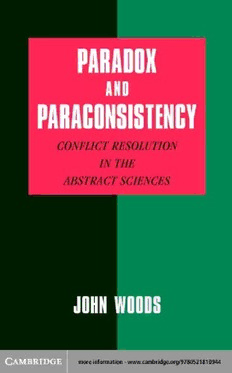
Paradox and Paraconsistency : Conflict Resolution in the Abstract Sciences PDF
Preview Paradox and Paraconsistency : Conflict Resolution in the Abstract Sciences
ParadoxandParaconsistency ConflictResolutionintheAbstractSciences In a world plagued by disagreement and conflict, one might expect thattheexactsciencesoflogicandmathematicswouldprovideasafe harbor. In fact, these disciplines are rife with internal divisions be- tweendifferent,oftenincompatiblesystems.Dothesedisagreements admit of resolution? Can such resolution be achieved without dis- turbingassumptionsthatthetheoremsoflogicandmathematicsstate objectivetruthsabouttherealworld? In this original and historically rich book, John Woods explores apparentlyintractabledisagreementsinlogicandthefoundationsof mathematicsandsetsoutconflictresolutionstrategiesthatevadeor disarm these stalemates. Among the conflicts to which these strate- giesareappliedare:thedisagreementbetweenclassicalandrelevant logicians;Quine’sattackonquantifiedmodallogic;disagreementas towhetherdialethiclogichasanadequatemotivation;conflictsabout how to understand the paradox of sets and the Liar paradox; the vexedrelationshipbetweenmodernlogicandtheoriesofreasoning; andconditionsunderwhichlogicallawsexhibitnormativeforce. An important subtheme of the book is the extent to which plu- ralisminlogicandthephilosophyofmathematicsunderminesrealist assumptions.Woods’sresponseisanaccountoftruthinwhichrealism isanirresistibleepiphenomenon. Thisbookmakesanimportantcontributiontosuchareasofphilos- ophyaslogic,philosophyoflanguage,andargumentationtheory,but italsowillbeofinteresttomathematiciansandcomputerscientists. JohnWoodsisDirectoroftheAbductiveSystemsGroup,University ofBritishColumbia. Paradox and Paraconsistency Conflict Resolution in the Abstract Sciences JOHN WOODS UniversityofBritishColumbia Cambridge, New York, Melbourne, Madrid, Cape Town, Singapore, São Paulo Cambridge University Press The Edinburgh Building, Cambridge , United Kingdom Published in the United States of America by Cambridge University Press, New York www.cambridge.org Information on this title: www.cambridage.org/9780521810944 © John Woods 2003 This book is in copyright. Subject to statutory exception and to the provision of relevant collective licensing agreements, no reproduction of any part may take place without the written permission of Cambridge University Press. First published in print format 2002 - isbn-13 978-0-511-07281-9 eBook (EBL) - isbn-10 0-511-07281-3 eBook (EBL) - isbn-13 978-0-521-81094-4 hardback - isbn-10 0-521-81094-9 hardback isbn--13 978-0-521-00934-8 paperback - isbn-10 0-521-00934-0 paperback Cambridge University Press has no responsibility for the persistence or accuracy of s for external or third-party internet websites referred to in this book, and does not guarantee that any content on such websites is, or will remain, accurate or appropriate. InMemoryof RichardSylvan(ne´ Routley),1936–1996. RobGrootendorst,1944–2000. Contents Preface pageix Prologue:PostmodernLogic xi 1 ConflictintheAbstractSciences 1 2 Modalities 40 3 ManagingInconsistency 80 4 SemanticIntuitions 120 5 SetsandTruth 155 6 Fiction 196 7 CurryingLiars 228 8 Normativity 277 Notes 327 Bibliography 341 Index 359 vii Preface Thisworkarisesfromaseriesoflecturesonparaconsistentlogicdeliveredat theUniversityofGroningeninthespringtermof1988.Therefollowedayear laterascheduleoflecturesonQuine’sphilosophyoflogic.Thefruitsofthese endeavorscirculatedforawhileasTheGroningenLecturesonParaconsistent Logic.Myeffortsweregracedbyexcellentstudentsandgenerouscolleagues.I amespeciallygratefultoE.M.Barth,JeannePeijnenberg,ErikC.W.Krabbe, andDavidAtkinsonforsharpcriticismandhelpfulsupport.In1990,aFellow- shipattheNetherlandsInstituteforAdvancedStudymadeitpossibleforme tojointheresearchgrouponFallaciesasViolationsofRulesforArgumenta- tiveDiscourse.Iworkedthereonconflictresolutionstrategiesforintractable disagreementsinquestionsofpublicpolicy.Onlytowardtheendofmystay in Wassenaar did it occur to me that such strategies might be extended to contentious issues in the philosophy of logic and related fields. I owe much tothestimulationandencouragementofmyNIAScolleagues:projectleader FransH.vanEemeren,thelateRobGrootendorst,SallyJackson,ScottJacobs, Agne`svanRees,AgnesVerbeist,DouglasWalton,andCharlesWillard. Thus was born a preoccupation with conflict resolution in the abstract sciences, which became the main business of my University of Lethbridge courseonDeviantLogicin1991and1992.Thedistractionsofotherresearch projects and heavy administrative responsibilities entailed a postponement of this one until an appointment as Visiting Scholar in the Department of Philosophy at Stanford University in 1994 afforded me the stimulation and leisuretoturnmymindagaintoconflictresolution.InthisIwasmuchhelped byMichaelBratman,ChairoftheDepartment,JohanvanBenthem,Maurice Finocchiaro,DavidGrover,andTimothySchroeder.Administrativedutiesne- cessitatedafurtherpause,buttheprojectcametolifeagainandwascompleted thankstoaVisitingProfessorshipintheDepartmentofDiscourseAnalysis, ArgumentationTheory,andRhetoricattheUniversityofAmsterdaminthe springtermof1998and1999.IamindebtedtotheDepartment’sHead,Frans H.vanEemeren,andtohis(andmy)colleagues,thelateRobGrootendorst, ix
